We'll never ask you for your full PIN or password. If you're asked for this, it will be a scam and should be reported to us.
Common scams and how to avoid them
Scammers are always looking for new, clever and convincing ways to trick people. Stay up to date with the latest scams to keep your personal and banking details safe.
Fake emails
Known as phishing
Emails pretending to be from legitimate sources, however that are asking you to give away personal or private information.
Fake telephone calls
Known as vishing
Phone calls from fraudsters that encourage you to give out personal details, such as your debit card number or card reader codes.
Fake text messages
Known as smishing
When a fraudster sends a text message to try and trick you into giving away your personal and security information.
Identity theft
Identity theft is when a fraudster steals your personal information, usually so they can use it to impersonate you.
Examples of fake text messages
WhatsApp family impersonation scam
The fraudster will send a message from a phone number you don't recognise and begin a conversation with something non-specific, e.g. ‘Hi buddy’ and claim that they've lost their phone. Normally they'll say they need funds urgently, i.e. to pay a bill and ask you to transfer money.
Delivery scams
You receive a message stating a driver has tried to deliver your parcel and asking you to click a link to reschedule. You're then asked to enter sensitive info like your date of birth, mobile number and card details. If you submit personal data, scammers could use it to call you up or access your bank account.
Fake messages impersonating the bank
These text messages claim to be from NatWest International and will advise you to click the link in the message. The link will then take you to a site where they'll ask you to enter your banking information and steal it.
Examples of fake telephone calls
Impersonation
Criminals impersonating the bank or police is one of the most common scams we see. It can have a devastating impact on victims so it's vital you can spot these before it's too late.
Remote access fraud
A caller may claim there's an issue with your computer and insist on taking remote control to fix it. This may enable them to have access to your personal information such as your card details and PIN.
Examples of fake emails
Fake invoices
Where account details on an invoice are changed, or emails are intercepted, so the money is wrongly paid into the scammer’s account.
Fake advance fee requests
This is where you’re convinced by a scammer to pay an upfront fee in order to receive a prize/service, high-value goods or loans which never materialise.
Examples of investment fraud
Pension scams
The fraudster will encourage you to move pension funds with the promise of better returns and then the funds are usually stolen.
Fake investments
Criminals encourage you to invest in their schemes, often making promises of great returns, which often don't exist or are worthless.
Cryptocurrency scams
Emails asking for or blackmailing you for funds. They include: referral schemes, bogus investment and business opportunities.
Other types of scams
ATM fraud
Criminals can use various methods, such as inserting a device into a cash machine, to steal your bank details or your debit/credit card.
Social engineering
A fraudster will use social media to convince someone that they are trustworthy to obtain money or personal information from them.
SIM-swapping scams
A SIM swapping scam is when a scammer will try and transfer your phone number to another device for financial gain.
Direct debit fraud
Criminals advertise fake services online with how to get quick cash for cancelling a direct debit, which can leave you out of pocket.
Doorstep fraud
A doorstep scammer visits your home in the hope of scamming you out of your money or stealing items from your house.
Romance scam
Romance fraud occurs when you think you’ve met the perfect partner online, but it's a criminal using a fake profile to steal your money.



